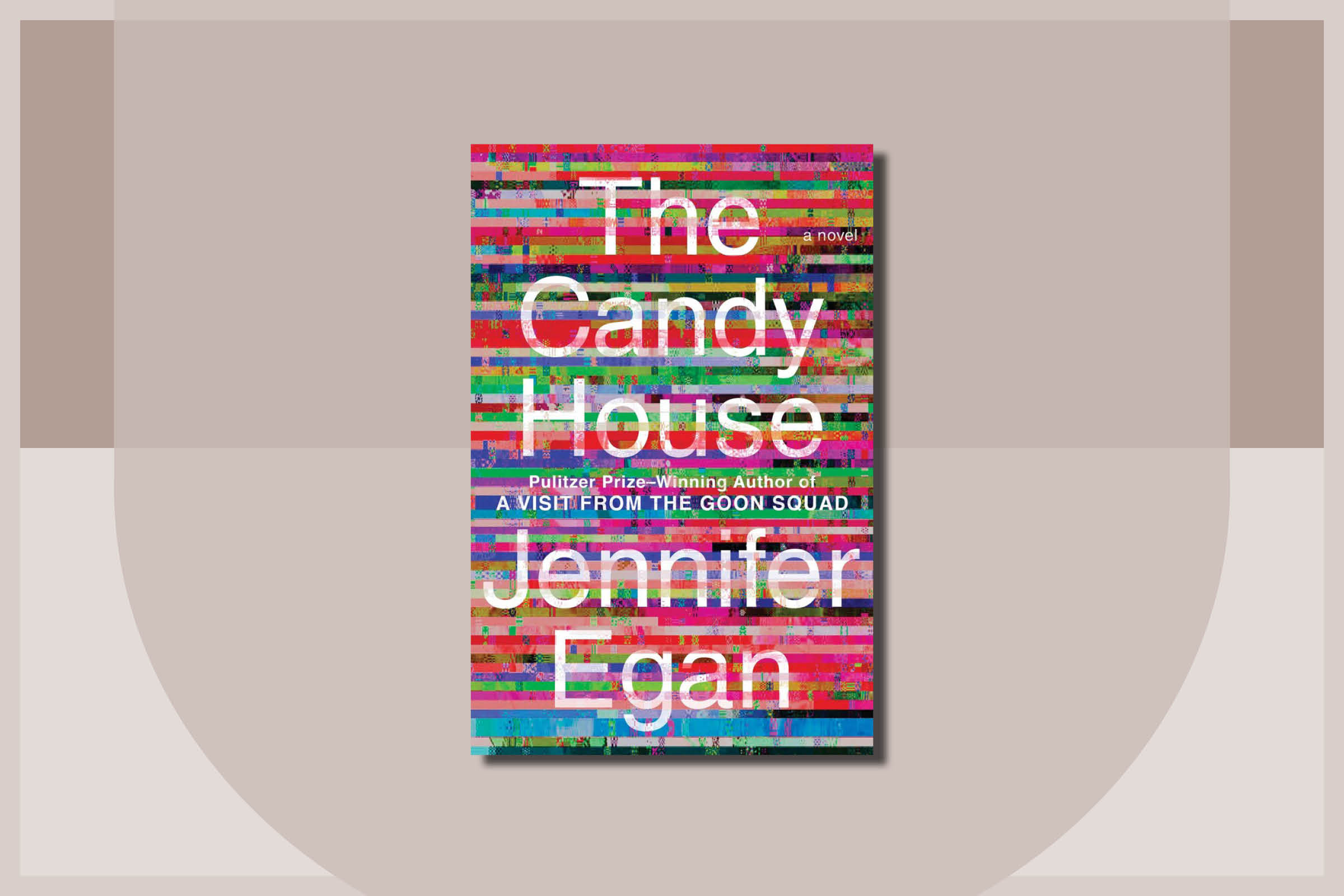
In 2015, Pulitzer-Prize-winning author Jennifer Egan was deep into revisions of her novel Manhattan Beach when the memory of a girl she had befriended as a child in San Francisco started to flit across her mind. Egan conjured images of tetherball games and bloody noses, but there were cloudy gaps. Her curiosity piqued, she pulled up Facebook and searched the woman’s name, only to find her profile flooded with condolences and remembrances. The woman had died two days earlier in a car accident.
“That had a huge impact on me,” Egan says, gazing out onto the East River from Brooklyn Bridge Park. “I found myself remembering her childhood as I experienced it, and wanting to see it more clearly. I know it’s all there in my mind—so why can I see some memories and not others?”
Egan wished for a machine that would allow her to revisit both her life and those of friends and family members she had lost too soon. So, in her next work of fiction, she invented one. That machine, called Own Your Unconscious, is the connective tissue of the stories in The Candy House, her new novel that arrives April 5.
The Candy House is one of the most anticipated books of the year, and not just because Egan has, for two decades, consistently sold out book tour dates across the country and drawn rave reviews for her fiction. This new work is a quasi-sequel to her most celebrated book: 2010’s A Visit From the Goon Squad, which won the Pulitzer Prize for fiction and appeared on several decade-end lists, including TIME’s. Goon Squad was hailed for its kaleidoscopic structure, which leapt across eras and literary styles as it unraveled a web of stories following loosely connected characters. One chapter was told via a Powerpoint presentation; another took the form of a scathing celebrity profile.
Read More: The 21 Most Anticipated Books of 2022
The Candy House similarly tells 14 stories that zig-zag between the 1960s and the 2030s, incorporating emails, teenage diaries, and spy mission logs. Many familiar characters are revisited, including Sasha, a kleptomaniac-turned-landscape artist, and Bennie, a washed-up rocker.
But there’s one significant change: where Goon Squad was organized primarily around the music industry, The Candy House shifts its focus to tech, and the world surrounding the social media magnate Bix Bouton, who appeared briefly in Goon Squad as an Internet obsessive in the early ’90s. In The Candy House, Bix invents Own Your Unconscious, which allows people to see into their pasts—but also forces them to upload their memories to a public cloud, effectively erasing privacy forever.
Egan’s memory machine serves two key purposes in the novel. First, it allows her to plumb more deeply into the pasts and futures of a set of characters who readers fell in love with more than a decade ago. It also allows her to confront one of the central developments of our time—the escalating integration of technology into our everyday lives—and to explore the consequences of what happens when social media and immersive tech are taken to their logical, invasive end.
“It’s so incredible to think of how wrong George Orwell got it: It’s not that anyone forces screens into every home,” Egan says. “It’s that we invite them.”
Egan’s work is fueled by a deep curiosity about other people—and that impulse is immediately evident. On the sunny March afternoon we meet in Brooklyn, she peppers me with questions about my Manhattan upbringing and forays into the music industry. A former journalist for the New York Times Magazine, she prefers when the subject is anyone or anything but herself. She used the word “curious” seven times in our hour-long walk, stopping often to marvel at each tableau as we pass by: a ballerina posing for a portrait atop the dancing waterfront, a tiny woman patiently walking a dozen large dogs.
Egan says she often walks and bikes around the city—including this stretch of esplanade—for inspiration. A key character in Goon Squad drowns in the East River, and much of Manhattan Beach takes place around the corner at the Brooklyn Navy Yard. “New York has been so generative and enriching to my writing process,” she says. “I love the anonymity and that I end up in close proximity to people from every walk of life.”
Goon Squad was born out of Egan’s belief that “everything is interesting”—that bit players in your life are the protagonists of their own equally compelling narratives. Because of the novel’s unspooling nature, Egan found herself wondering about those left lurking in the margins long after it was finished. “It felt like it was never really over for me,” she says. She began writing parts of The Candy House while on tour for Goon Squad, creating small anecdotes that only begat more questions.

But she didn’t want to simply retread her old ideas, lest she be accused of recycling Goon Squad’s immense success. She had to come up with new storytelling mechanisms, new protagonists, a completely different thematic conceit. After toying with many different ways in, she landed on the idea of centering Bix and his rapidly changing technological innovations as a way to tackle all three requirements. “The evolution of telecommunications technology is the story I have witnessed in my lifetime, without question,” Egan says. “There’s this state of constant evolution, and the change is so enormous.”
There are traces of a real-life tech god in Bouton: Egan herself briefly dated Steve Jobs when she was an undergraduate at the University of Pennsylvania and he was seven years into running Apple and seven years her elder. “Seeing how much people who invent things are really true believers: I think that some of that really comes from him, and maybe the awe with which a tech icon is treated,” Egan says of Jobs.
But moreso, The Candy House is driven by Egan’s interest in the intersections between old modes of storytelling, like novels, and new digital ones, like social media and video game streaming. Egan’s children, who are 19 and 21, spend some of their free time watching gamers navigate first-person video games via Twitch, a phenomenon that both fascinates and rankles her. “Watching a gamer narrate their experience is so much like being inside another consciousness that it gets the closest, in a way, to what fiction does,” she says. “But it’s also totally performative—there’s a slight disingenuousness at the core of it, as we’re only hearing the thoughts they want us to know.”
While the characters in The Candy House get genuine glimpses into each other’s psyches thanks to Own Your Unconscious, they also lose their autonomy: Bix’s company, Mandala, now tracks their every move and can even accurately predict their future behaviors. At the same time, the government places monitoring devices under its employees’ skin. In the novel’s hyper-connected world, a group of resistors known as Eluders emerges, scrubbing their digital imprints to live completely off the grid. Egan says that she would probably be an Eluder herself: as a young Baby Boomer, she still writes all her first drafts by hand.
But she doesn’t view the Own Your Unconscious technology as dystopian, because we’ve lived through similarly seismic technological changes before. “I read a lot of 19th-century fiction, and hear the same echoes of sadness and nostalgia when people are looking back at the time before the railroads: Because everything was suddenly so connected,” she says. She was initially planning to call the book The Thing That Changes Everything, a tongue-in-cheek statement about how, while big inventions provoke strong immediate reactions, “It’s so hard to really know what all of the changes will be.”
More recently, plenty of other writers have dreamt up mechanisms similar to Own Your Unconscious: in Black Mirror’s “The Entire History of You,” for example, and the new Apple TV+ series The Last Days of Ptolemy Grey, which Walter Mosley adapted from his 2010 novel. It’s unclear whether something like Own Your Unconscious will ever exist: Egan says she did no research into the techno-futurist aspects of the book, preferring to let her imagination run wild.
But the focus of the novel isn’t on the tech itself, anyway: it’s on how these characters—some of whom have been living in Egan’s mind for decades—would respond to such changes, providing evidence of our perseverance and shortsightedness alike in the face of change. And until her magic machine is invented, Egan and other lo-fi storytellers are doing just fine in fulfilling many of its positive powers: in placing our long, entangled histories into context; in spurring empathy, and satisfying our endless curiosity about others. “I’m the person who walks down the street, peeking into lighted windows,” Egan confesses, “Thinking, ‘What kind of life goes on in there?’”
More Must-Reads from TIME
- Cybersecurity Experts Are Sounding the Alarm on DOGE
- Meet the 2025 Women of the Year
- The Harsh Truth About Disability Inclusion
- Why Do More Young Adults Have Cancer?
- Colman Domingo Leads With Radical Love
- How to Get Better at Doing Things Alone
- Michelle Zauner Stares Down the Darkness
Contact us at letters@time.com